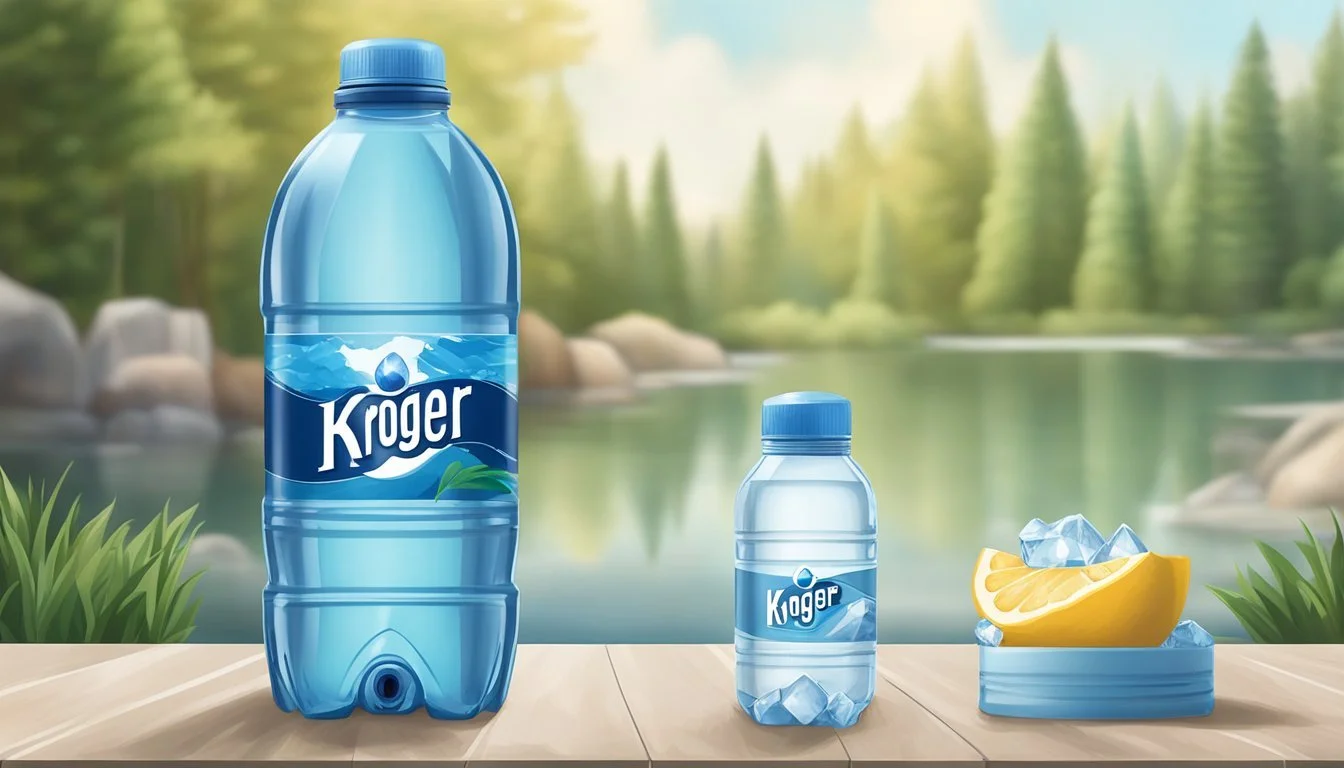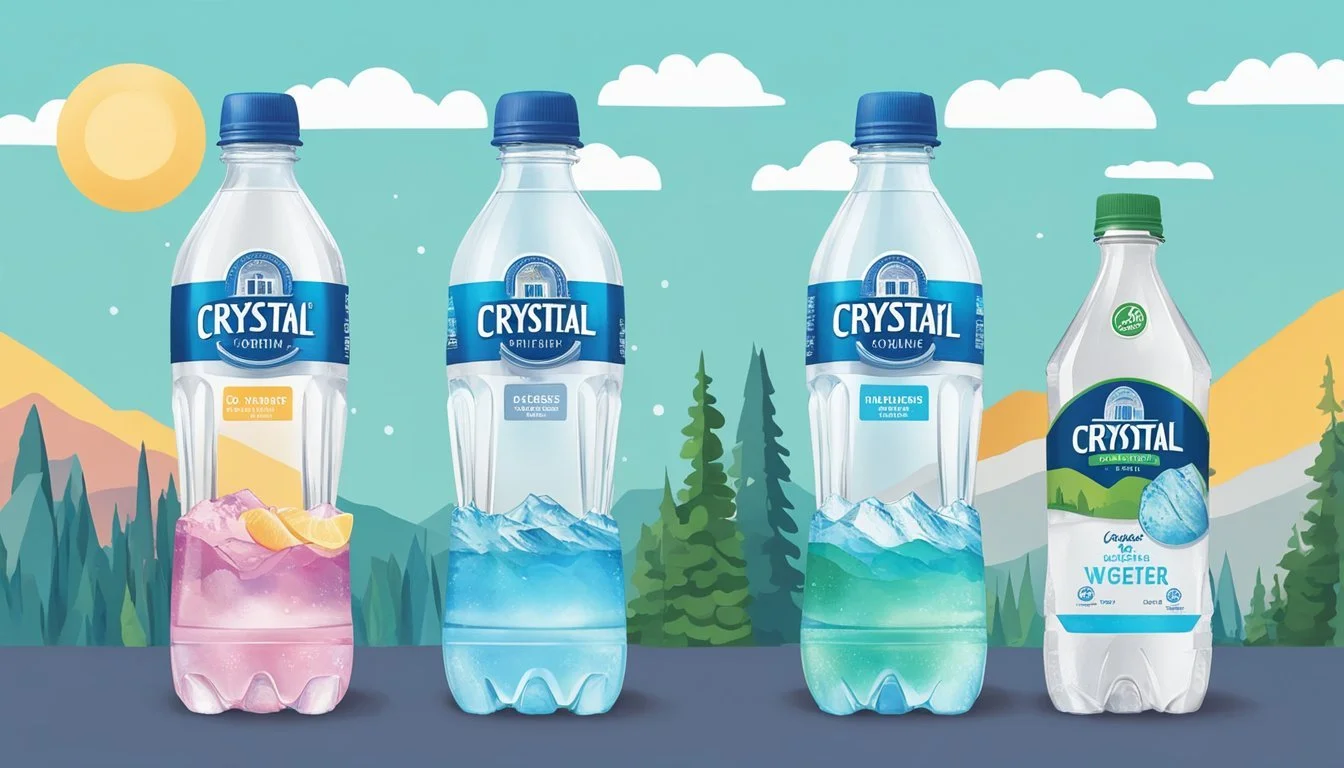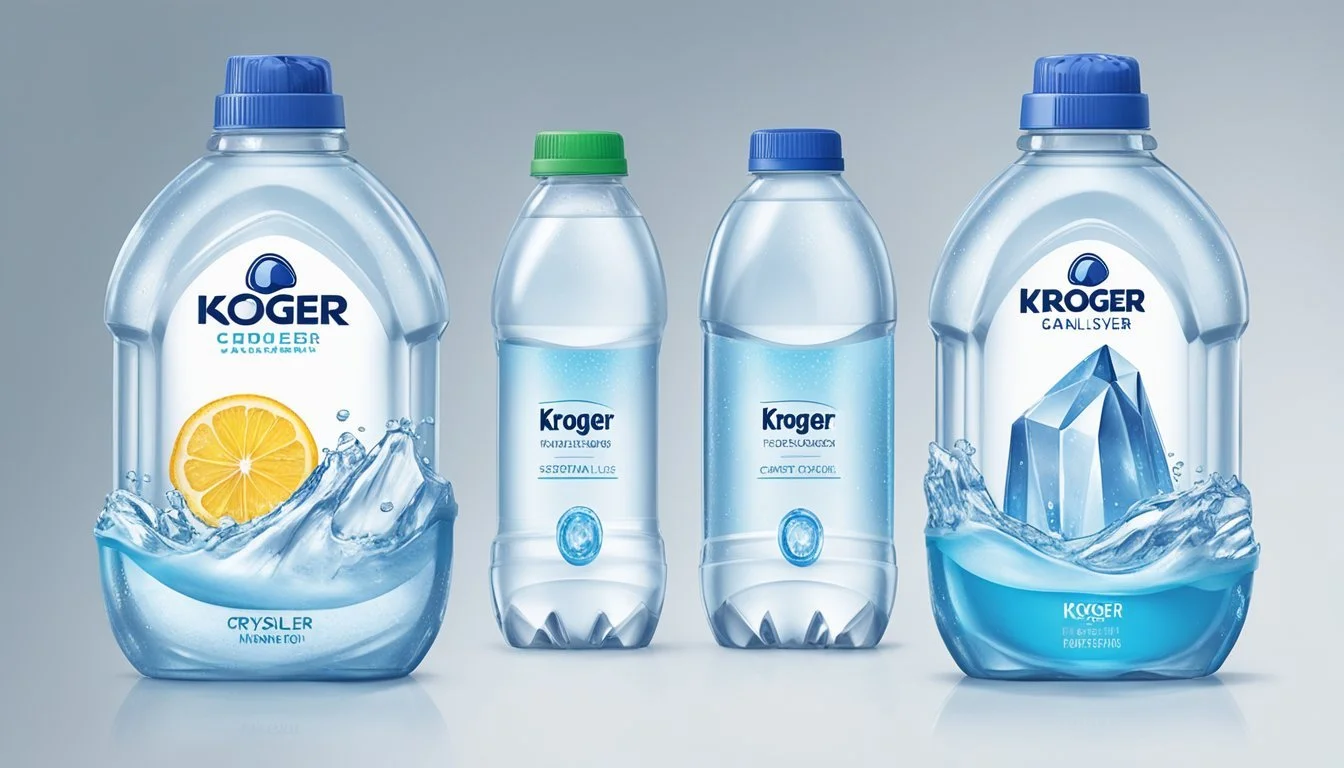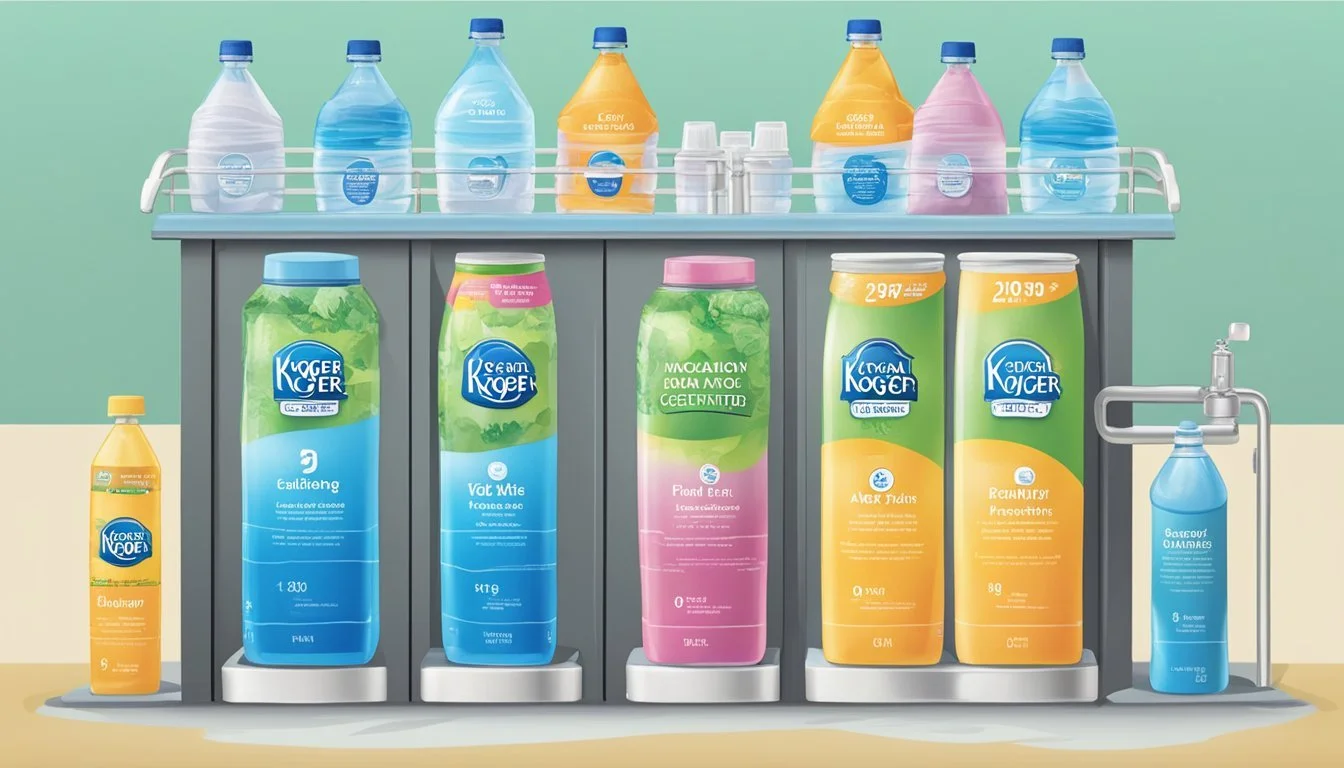Kroger vs. Crystal Geyser
Which Bottled Water is Better for You?
When it comes to choosing bottled water, Kroger's store brand and Crystal Geyser are two popular options that consumers often consider. Each brand offers unique characteristics that can influence a buyer's decision. Kroger's bottled water is known for its affordability and wide availability, making it a convenient choice for many shoppers.
On the other hand, Crystal Geyser prides itself on its commitment to bottling at the source. Crystal Geyser's water often comes from natural springs, which appeals to those looking for a more pristine and potentially purer water source. While some may argue that it tastes more 'natural,' others might find it lacks the consistent taste they expect from purified water.
While Kroger's brand may be more budget-friendly, Crystal Geyser's emphasis on natural sources and quality claims attract customers who prioritize these factors in their bottled water. Ultimately, the choice between Kroger and Crystal Geyser boils down to personal preference regarding cost, taste, and perceived quality.
Understanding Bottled Water
Various types of bottled water have unique characteristics and are regulated under different standards. Consumers should be informed about these distinctions and the requirements that manufacturers must follow.
Definitions and Types of Bottled Water
Bottled waters encompass multiple types, each with particular attributes. Spring water comes from an underground formation from which water flows naturally to the earth’s surface. It must be collected directly from the spring or via a borehole tapping the underground formation feeding the spring.
Purified water, on the other hand, is produced by distillation, deionization, or other suitable processes. This results in water that is essentially free from any dissolved solids. Unlike spring water, purified water does not have to come from a natural source and can originate from tap water.
Mineral water contains specific proportions of dissolved minerals or gases and must come from a protected underground water source. Each of these types provides different tastes and mineral contents, which can influence consumer preference.
Regulatory Landscape for Bottled Water
Bottled water in the United States is regulated by the Federal Government, specifically the Food and Drug Administration (FDA). The FDA has strict requirements that bottled water manufacturers must comply with to ensure safe drinking water.
Bottled water must meet stringent labeling standards, specifying the type of water it contains. Additionally, the FDA mandates that the processing, bottling, and transport of bottled water are conducted under sanitary conditions.
The FDA’s guidelines are in place to ensure that bottled water is safe for consumption, mirroring the standards set for public tap water systems. While compliance with federal standards is mandatory, states may also impose additional regulations for industry adherence.
Brand Overview
Kroger and Crystal Geyser are two popular bottled water brands with distinct histories and product offerings. Understanding their origins and product lines can help consumers make more informed choices.
History and Origin of Kroger and Crystal Geyser
Kroger, established in 1883 by Bernard Kroger in Cincinnati, Ohio, is one of the largest supermarket chains in the United States. Initially a grocery store, Kroger expanded into various sectors including bottled water, leveraging its extensive distribution network.
Crystal Geyser, on the other hand, was founded in 1977 and is well-known for its Crystal Geyser Natural Alpine Spring Water. This brand focuses on sourcing water from natural springs, distinguishing itself with a commitment to natural spring water, especially from sources in the Sierra Nevada Mountains and other pristine locations.
Product Lines and Varieties
Kroger offers a wide array of bottled water products under its private label. These include basic purified water, flavored waters, and enhanced waters with added vitamins and minerals. The aim is to provide affordable yet diverse options for various consumer needs.
Crystal Geyser's main product is Crystal Geyser Natural Alpine Spring Water, which is marketed as 100% natural spring water. They package their water at the source to maintain purity. Additionally, Crystal Geyser offers sparkling water and flavored sparkling waters, keeping a focus on natural ingredients.
By understanding these brand specifics, consumers can better match their preferences with the right bottled water option.
Comparing Water Quality and Sources
Kroger and Crystal Geyser bottled waters have distinct approaches in sourcing their water and ensuring its quality. This section delves into the sourcing methods and key metrics like pH levels and mineral content.
Water Sourcing Methods
Kroger: Kroger's bottled water typically comes from municipal sources or natural springs. Municipal sources go through rigorous purification processes, including reverse osmosis and carbon filtration, to remove contaminants such as lead, arsenic, and microplastics. The labels usually indicate the specific source, ensuring transparency.
Crystal Geyser: Crystal Geyser prides itself on bottling at the source, meaning the water is collected directly from the spring. This can help maintain natural mineral content and pH balance. Bottling at the source can reduce contamination risks from handling and transportation.
Both brands prioritize safety and clarity in their water sourcing. Kroger uses advanced filtration to achieve purity, whereas Crystal Geyser focuses on maintaining natural integrity by bottling directly at the springs.
PH Levels and Mineral Content
Kroger: The pH level of Kroger bottled water can vary based on its source and the purification process. Purification can strip minerals, sometimes necessitating the addition of electrolytes for taste. Typically, Kroger’s water falls in a neutral pH range, but labels should be checked for specifics.
Crystal Geyser: Crystal Geyser water often retains a natural pH balance due to minimal processing. This can result in a slightly alkaline pH, which some consumers prefer. The presence of natural minerals such as calcium and magnesium can enhance taste and provide minor health benefits.
Kroger and Crystal Geyser offer different mineral profiles and pH balances, reflecting their distinct purification philosophies. Consumers should consider their preferences for mineral content and pH when choosing between these brands.
Taste Profile and Texture
Kroger and Crystal Geyser bottled waters present distinct taste profiles and textures that set them apart from each other and from other brands like Evian, Fiji Water, and Dasani.
Factors Influencing Taste
Taste is influenced by the water source, mineral content, and purification process.
Kroger water is often sourced from municipal supplies and goes through reverse osmosis, which tends to strip the water of its natural minerals, resulting in a cleaner but sometimes bland taste.
Crystal Geyser, sourced from natural springs, retains more of its natural mineral content, giving it a slight mineral taste that some find refreshing.
Brands like Evian and Fiji Water are known for their unique mineral compositions, which contribute to their distinct and often preferred taste profiles.
Texture Comparison
Texture is another crucial factor.
Kroger water, due to its purification process, has a smooth and almost slick texture, which can feel very clean but may lack the natural mouthfeel some prefer.
Crystal Geyser, with its spring water origins, offers a more complex texture. It can feel slightly heavier and more substantial on the palate.
Comparatively, Dasani and Evian also provide different textures influenced by their processing and mineral content. Evian, with its high mineral levels, has a creamy texture, while Dasani's purified water often feels weightless.
Depending on personal preferences, these textural differences can significantly impact the perceived quality of each brand.
Bottled Water and Health
When it comes to choosing between Kroger and Crystal Geyser, understanding the health implications is essential. Key areas of concern include how these waters support hydration and electrolyte balance.
Hydration and Electrolyte Balance
Both Kroger and Crystal Geyser bottled waters contribute to daily hydration needs. Staying hydrated is critical for bodily functions such as temperature regulation, joint lubrication, and nutrient transport.
Electrolyte Balance: Some bottled waters naturally contain electrolytes like sodium, potassium, and magnesium. These minerals support nerve function and muscle contractions. Crystal Geyser sources its water from springs, which may offer a natural blend of these electrolytes. In contrast, Kroger water's electrolyte content depends on the specific source and processing.
Contamination concerns also arise, particularly related to microplastics and other pollutants. Testing and adherence to FDA guidelines are essential for ensuring safety. Both brands must undergo rigorous quality checks to prevent contamination and harmful effects, like increased cancer risk due to long-term exposure to pollutants.
Environmental Impact
Kroger and Crystal Geyser both face scrutiny regarding their plastic usage and sustainability practices. The environmental implications of their products hinge on packaging and conservation efforts.
Packaging and Plastics
Plastic bottles contribute significantly to environmental pollution. Kroger adheres to FDA regulations, offering many BPA-free bottles. However, concerns about microplastics persist.
Crystal Geyser markets itself with the claim of bottling at the source. Despite this, it still relies on plastic for packaging, which poses ecological challenges.
The Environmental Working Group highlights the pervasive issue of plastic waste. Both brands have yet to fully transition to more sustainable solutions like boxed water or other eco-friendly materials, impacting their overall environmental footprint.
Sustainability and Water Source Conservation
Kroger sources its water with attention to safety and quality but often doesn't emphasize sustainable practices publicly. The environmental impact of transportation and extraction remains a concern.
On the other hand, Crystal Geyser takes pride in its "bottled at the source" strategy. While this can reduce transportation emissions, it still extracts considerable water volumes, potentially impacting local ecosystems.
Both brands need to improve their conservation methods. Transitioning to sustainable water sourcing and reducing carbon emissions from their operations will be crucial for lowering their environmental impact.
Consumer Information
Consumers often seek clear and detailed information regarding the quality and sourcing of their bottled water. Transparency in labeling and access to water quality reports are pivotal for making informed choices.
Labeling and Transparency
Labeling on bottled water provides crucial information about the source and composition of the water. Kroger bottled water labels comply with FDA regulations, providing details on the source and type. This ensures customers are aware of where their water originates.
Crystal Geyser also offers labeling that includes the water source, yet concerns by investigative journalists have surfaced about the transparency of their practices. The presence of labels that provide in-depth information helps build trust among consumers looking for safe and clean drinking water.
Water Quality Reports and Certifications
Both Kroger and Crystal Geyser regularly publish water quality reports. Kroger adheres to stringent FDA regulations and provides reports that detail any contaminants found, ensuring they meet safety standards. They follow safety protocols, although concerns over contaminants like microplastics exist.
Crystal Geyser is known for its rigorous testing and adherence to quality standards. Reports indicate their water often meets the safety standards set by the International Bottled Water Association (IBWA). These reports are crucial for consumers who prioritize the purity and safety of their bottled water, providing verifiable and reliable information.
Price and Accessibility
Kroger and Crystal Geyser bottled water brands are analyzed for their cost and how widely they can be accessed both in physical stores and online platforms.
Cost Comparison
When comparing the cost of Kroger and Crystal Geyser bottled water, Kroger tends to be more economical. A gallon of Kroger spring water is typically priced around $1.29, making it a budget-friendly option.
Crystal Geyser, while also reasonably priced, can be somewhat more expensive in certain regions. On average, Crystal Geyser is sold at around $1.50 per gallon, depending on the location and store. Despite minor price differences, each brand offers affordable options for those looking for everyday drinking water.
Availability Across States and Online
Kroger water is widely available in Kroger stores across various states, making it a convenient choice for individuals who shop there regularly. Additionally, Kroger's online store provides easy access for those wishing to buy in bulk.
Crystal Geyser boasts extensive distribution and can be found in numerous grocery chains across many states. It is accessible in stores like Walmart and Target. Crystal Geyser is also available online through major retailers such as Amazon and store-specific websites, expanding its reach beyond local grocers.
Both brands have robust distribution networks, ensuring that consumers across multiple states can easily purchase them either in-store or online.
Consumer Preferences and Trends
Consumer preferences for bottled water have shifted significantly over recent years. People are increasingly concerned about the source and purity of the water they consume. Kroger water is widely accessible and affordable, making it a popular choice for everyday consumers.
Crystal Geyser caters to those looking for spring water. Its reputation for purity has made it a preferred brand among certain consumer groups.
Essentia, Smartwater, and Core Hydration are premium brands that appeal to health-conscious individuals. These waters often feature electrolytes and alkalinity, promising enhanced hydration. Their stylish packaging and marketing also attract a younger demographic.
Consumers often look for specific attributes in their bottled water, such as low sodium content, lack of contaminants, and favourable pH levels. Reports of PFAS chemicals and microplastics in some brands have influenced consumer trust and preference.
Here is a table comparing key attributes:
Brand Source Key Features Target Consumer Kroger Municipal Affordable, Accessible General Consumers Crystal Geyser Spring Pure, Natural Health-Conscious Essentia Municipal Electrolytes, Alkaline Athletes, Youth Smartwater Municipal Vapor Distilled, Electrolytes Healthy Lifestyle Core Hydration Municipal Perfect pH, Nutrients Fitness Enthusiasts
Trends show that more consumers are now reading labels and checking for certifications. Brand loyalty is declining as people prioritize health and environmental impacts over longstanding brand names.
Reusable water bottles have also gained traction, causing sporadic shifts in the bottled water market. Brands that focus on sustainable practices may see a rise in preference among eco-conscious consumers.
More About Kroger
Kroger vs Kirkland Signature: Which Bottled Water is Better?
Kroger vs Richard's Rainwater: Which Bottled Water is Better?
Mountain Valley Spring Water vs Kroger: Which Bottled Water is Better?
Whole Foods Italian Still Mineral water vs Kroger: Which Bottled Water is Better?
More About Crystal Geyser
Acqua Pana vs Crystal Geyser: Which Bottled Water is Better?
Alkaline88 vs Crystal Geyser: Which Bottled Water is Better?
Aqua Carpatica vs Crystal Geyser: Which Bottled Water is Better?
Boxed Water vs Crystal Geyser: Which Bottled Water is Better?
Cascade Mountain vs Crystal Geyser: Which Bottled Water is Better?
Castle Rock vs Crystal Geyser: Which Bottled Water is Better?
Core Hydration vs Crystal Geyser: Which Bottled Water is Better?
Crystal Geyser vs CBD Living: Which Bottled Water is Better?
Crystal Geyser vs Crystal Lake: Which Bottled Water is Better?
Crystal Geyser vs Essence pH10: Which Bottled Water is Better?
Crystal Geyser vs Kirkland Signature: Which Bottled Water is Better?
Crystal Geyser vs Open Water: Which Bottled Water is Better?
Crystal Geyser vs Proud Source: Which Bottled Water is Better?
Crystal Geyser vs Richard's Rainwater: Which Bottled Water is Better?
Crystal Geyser vs Simple Truth: Which Bottled Water is Better?
Crystal Geyser vs Talking Rain AQA: Which Bottled Water is Better?
Crystal Geyser vs Weird Water: Which Bottled Water is Better?
Crystal Geyser vs Whole Foods 365: Which Bottled Water is Better?
Hawaii Volcanic vs Crystal Geyser: Which Bottled Water is Better?
Hawaiian Springs vs Crystal Geyser: Which Bottled Water is Better?
Ice Mountain vs Crystal Geyser: Which Bottled Water is Better?
Icelandic Glacial vs Crystal Geyser: Which Bottled Water is Better?
Just Water vs Crystal Geyser: Which Bottled Water is Better?
Liquid Death vs Crystal Geyser: Which Bottled Water is Better?
Mountain Valley Spring Water vs Crystal Geyser: Which Bottled Water is Better?
Nestle Pure Life vs Crystal Geyser: Which Bottled Water is Better?
Poland Spring vs Crystal Geyser: Which Bottled Water is Better?
Purely Sedona vs Crystal Geyser: Which Bottled Water is Better?
San Pellegrino vs Crystal Geyser: Which Bottled Water is Better?
Smartwater vs Crystal Geyser: Which Bottled Water is Better?
Solan de Cabras vs Crystal Geyser: Which Bottled Water is Better?
Topo Chico vs Crystal Geyser: Which Bottled Water is Better?
Whole Foods Italian Still Mineral water vs Crystal Geyser: Which Bottled Water is Better?
Zephyrhills vs Crystal Geyser: Which Bottled Water is Better?






